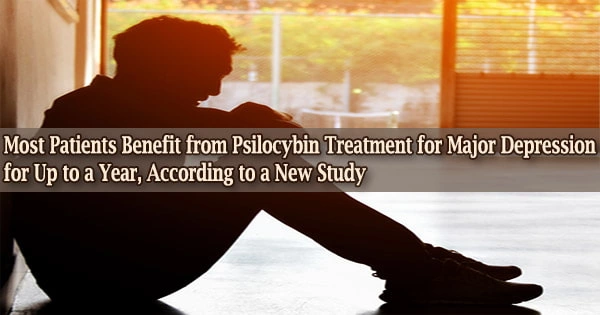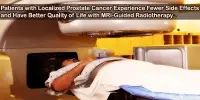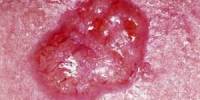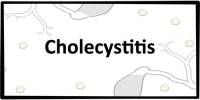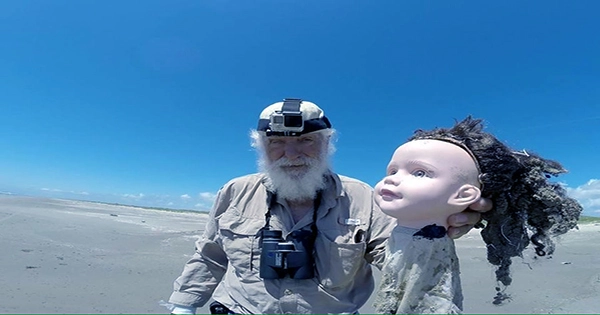Psychedelic treatment with psilocybin improved major depressive disorder symptoms in adults for up to a month, according to previous studies by Johns Hopkins Medicine researchers.
The researchers now report that the considerable antidepressant effects of psilocybin-assisted therapy, administered with supportive psychotherapy, may endure at least a year for some patients in a follow-up analysis of those participants.
The Journal of Psychopharmacology published a report on the new study on February 15, 2022.
“Our findings add to evidence that, under carefully controlled conditions, this is a promising therapeutic approach that can lead to significant and durable improvements in depression,” says Natalie Gukasyan, M.D., assistant professor of psychiatry and behavioral sciences at the Johns Hopkins University School of Medicine.
She cautions, however, “the results we see are in a research setting and require quite a lot of preparation and structured support from trained clinicians and therapists, and people should not attempt to try it on their own.”
There has been a growing resurgence of research with traditional psychedelics, a pharmacological class of substances that includes psilocybin, a substance found in so-called magic mushrooms, over the last 20 years.
Psilocybin can alter a person’s awareness of their environment, as well as their thoughts and feelings, according to the National Institute on Drug Abuse. Treatment with psilocybin has showed promise in the treatment of a variety of mental health illnesses and addictions in research settings.
The researchers enlisted 27 people with a lengthy history of depression for this study, the majority of whom had been suffering from depressive symptoms for at least two years prior to enrollment. The participants were on average 40 years old, 19 of whom were women, and 25 of whom identified as white, one as African American, and one as Asian.
Eighty-eight percent of the individuals had previously been treated with typical antidepressant drugs, and 58 percent said they were currently taking antidepressants.
Following screening, individuals were randomly assigned to one of two groups: those who received the intervention immediately, or those who received it after an eight-week wait period. All participants had six to eight hours of preparatory meetings with two treatment facilitators prior to starting therapy.
Participants were given two doses of psilocybin, about two weeks apart, at the Behavioral Biology Research Center at Johns Hopkins Bayview Medical Center between August 2017 and April 2019.
Psilocybin not only produces significant and immediate effects, it also has a long duration, which suggests that it may be a uniquely useful new treatment for depression. Compared to standard antidepressants, which must be taken for long stretches of time, psilocybin has the potential to enduringly relieve the symptoms of depression with one or two treatments.
Roland Griffiths
One day and one week after each session, as well as one, three, six, and twelve months after the second session, participants returned for follow-up; 24 people completed both psilocybin sessions and all follow-up assessment visits.
The researchers found that psilocybin treatment resulted in significant reductions in depression in both groups, and that the intensity of depression remained low one, three, six, and 12 months following treatment.
The GRID-Hamilton Depression Rating Scale, a common depression evaluation tool, was used to assess depressive symptoms before and after treatment. A score of 24 or more indicates severe depression, 17-23 moderate depression, 8-16 mild depression, and 7 or less no depression.
Most participants’ overall treatment scores reduced from 22.8 before therapy to 8.7 after one week, 8.9 after four weeks, 9.3 after three months, 7 after six months, and 7.7 after a year. Throughout the follow-up period, participants exhibited consistent rates of treatment response and symptom remission, with 75 percent responding and 58 percent remission at 12 months.
“Psilocybin not only produces significant and immediate effects, it also has a long duration, which suggests that it may be a uniquely useful new treatment for depression,” says Roland Griffiths, Ph.D., the Oliver Lee McCabe III, Ph.D., Professor in the Neuropsychopharmacology of Consciousness at the Johns Hopkins University School of Medicine, and founding director of the Johns Hopkins Center for Psychedelic and Consciousness Research.
“Compared to standard antidepressants, which must be taken for long stretches of time, psilocybin has the potential to enduringly relieve the symptoms of depression with one or two treatments.”
The researchers point out that more research is needed to determine whether the efficacy of psilocybin treatment can last much longer than 12 months. A national multisite randomized, placebo-controlled trial of psilocybin for major depressive disorder is being conducted at Johns Hopkins.
Alan Davis, Frederick Barrett, Mary Cosimano, Nathan Sepeda, and Matthew Johnson from the Johns Hopkins University School of Medicine also contributed to the study.
A crowd-sourced campaign coordinated by Tim Ferriss, as well as funds from the Riverstyx Foundation and Dave Morin, helped support the research. A grant from the National Institutes of Health (T32DA07209, National Institute on Drug Abuse) supported Alan Davis and Natalie Gukasyan’s research.
The Center for Psychedelic and Consciousness Research, which is supported by the Steven and Alexandra Cohen Foundation, Tim Ferriss, Matt Mullenweg, Craig Nerenberg, and Blake Mycoskie, also gave assistance to the writers. The funders had no input on the study’s design, data collection, or analysis, as well as the decision to publish or the preparation of the paper.
COI: Alan Davis is a board member of Source Research Foundation. Matthew Johnson has received grant support from the Heffter Research Institute that is unrelated to this study, and he is an advisor to the following companies: AJNA Labs, AWAKN Life Sciences, Beckley Psytech, Entheon Biomedical, Field Trip Psychedelics, Mind Medicine, Otsuka Pharmaceutical Development & Commercialization and Silo Pharma.
Roland Griffiths is a member of the Heffter Research Institute’s board of directors and has received funding from the institute for research not related to this study. Griffiths is the site primary investigator, and Johnson and Gukasyan are co-investigators in a Usona Institute-sponsored multisite trial of psilocybin-assisted therapy for major depressive disorder.
